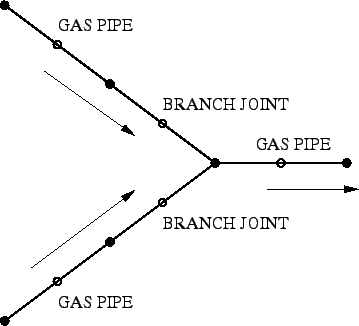 |
In a joint the flow from two gas pipes is united and redirected through a third pipe. So in principal three network elements of type GAS PIPE have one node in common in a joint. The fluid elements of type BRANCH JOINT represent the extra energy loss due to the merging of the flows and have to be inserted on the incoming branches of the joint. This is represented schematically in Figure 89. The filled circles represent corner nodes of the fluid elements, the others are the midside nodes. For a joint to work properly the flow direction must be as indicated in Figure 89. If the solution of the equation system indicates that this is not the case appropriate measures must be taken. For instance, if the solution reveals that there is one inward flow and two outward flows, branch split elements must be selected.
Several types of geometry are available.
A branch joint of type GE [69], Figure 90, is quite general and allows arbitrary cross sections and angles (within reasonable limits). It is characterized by the following constants (to be specified in that order on the line beneath the *FLUID SECTION, TYPE=BRANCH JOINT GE card):
A branch joint of type Idelchik1, Figure 91, can be used if one of the incoming branches is continued in a straight way and does not change its cross section [31]. It is characterized by the following constants (to be specified in that order on the line beneath the *FLUID SECTION, TYPE=BRANCH JOINT IDELCHIK1 card):
A branch joint of type Idelchik2, Figure 92, can be used if one of the incoming branches is continued in a straight way but may change its cross section [31]. It is characterized by the following constants (to be specified in that order on the line beneath the *FLUID SECTION, TYPE=BRANCH JOINT IDELCHIK2 card):
By specifying the parameter LIQUID on the *FLUID SECTION card the loss is calculated for liquids. In the absence of this parameter, compressible losses are calculated.
Example files: branchjoint1, branchjoint2, branchjoint3, branchjoint4.